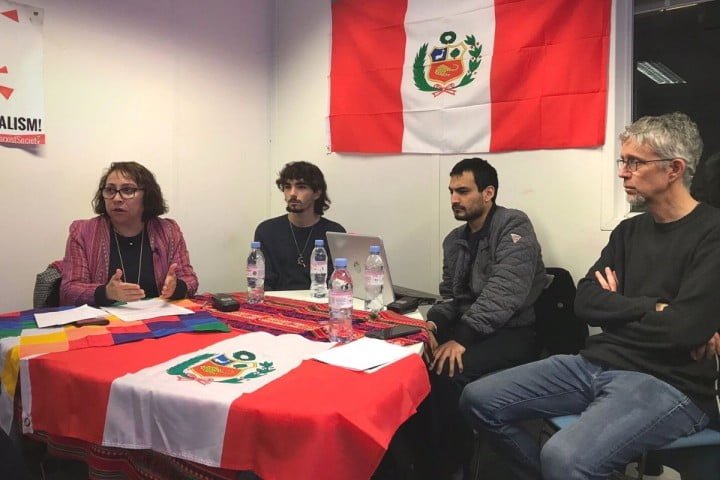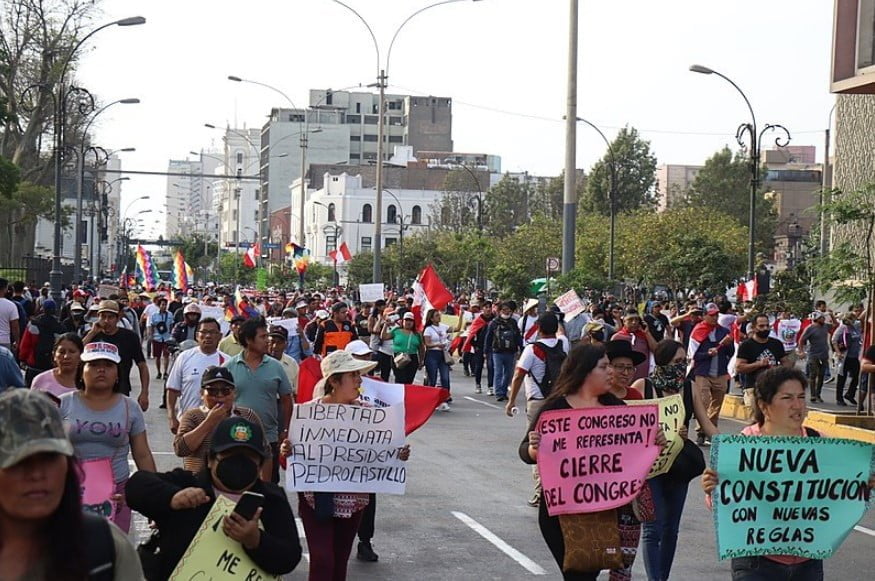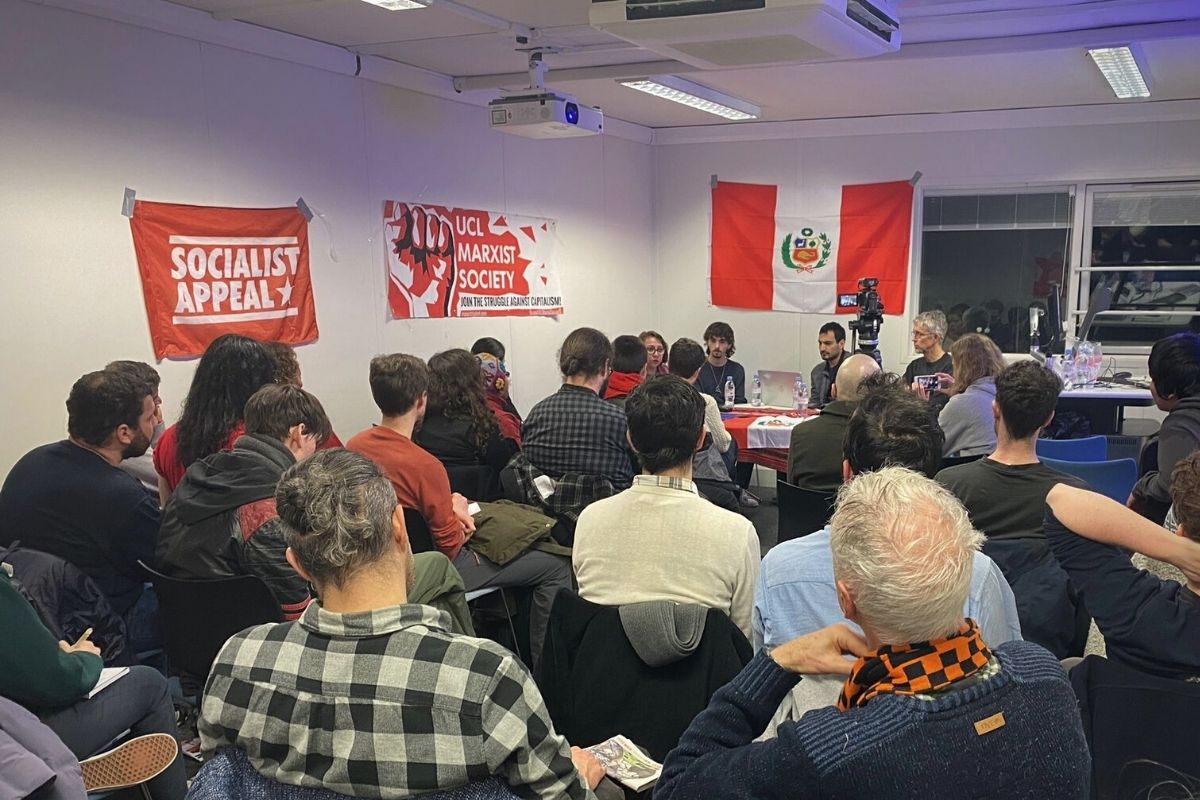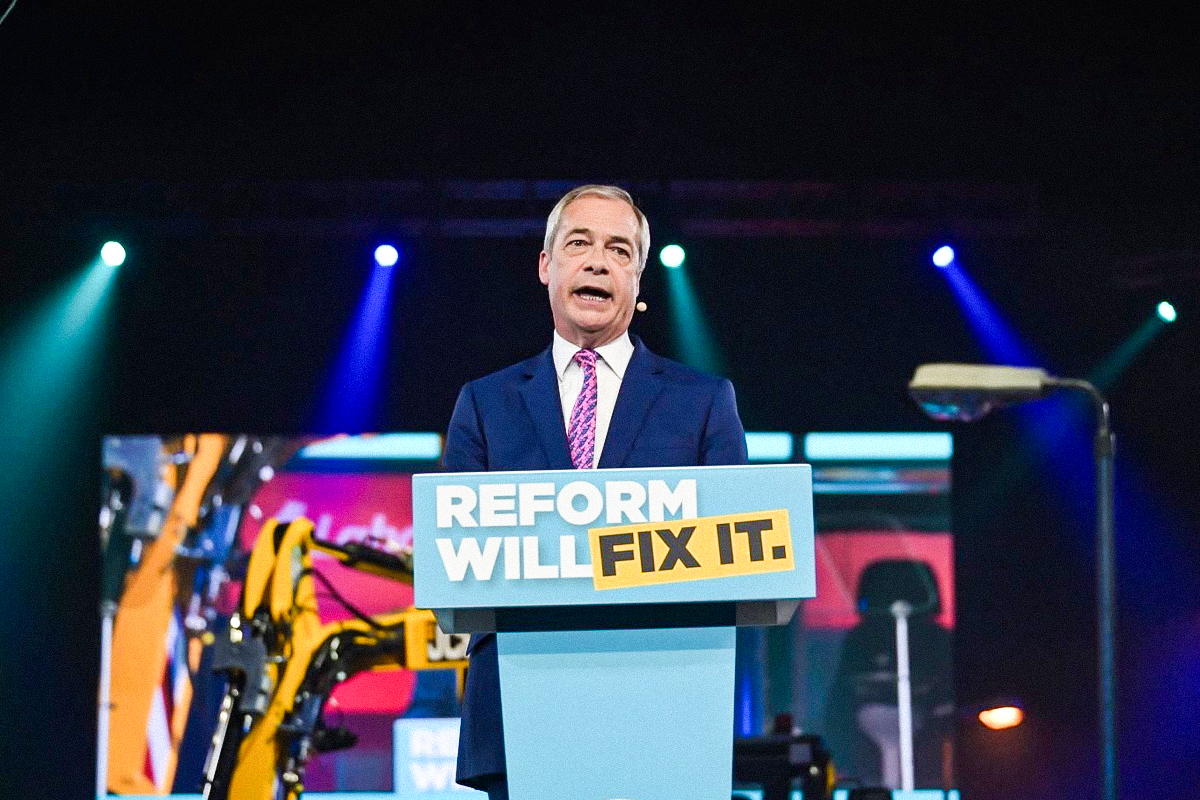The UCL Marxist Society hosted a solidarity meeting last night (Wednesday 25 January) in response to the coup in Peru against President Castillo, and the heavy repression of the mass movement by the Boluarte regime.
The meeting was jointly organised with the Marxist Student Federation, Hands off Venezuela, and the Plataforma 12 de Octubre. The packed UCL classroom had over 45 people in attendance, showing that there is a huge interest in discussing the turbulent events and inspiring struggle in Peru.
Packed meeting in London tonight to discuss the heroic movement of workers and peasants against the coup in Peru pic.twitter.com/vu2EHT4vvX
— Socialist Appeal (@socialist_app) January 25, 2023
The first speaker of the evening, Betty Rhaza from the Micaela Bastidas Movement UK, gave the audience a historical background to the current situation.
Betty started with the Fujimori regime in 1990, before discussing the 7 December coup, and then moving onto the workers’ and peasants’ insurrection taking place in her home country.
The second speaker, Cesar Burga of Izquierda Socialista Perú, who has just returned from Lima, spoke on the current movement of workers and peasants. Cesar explained the background to the ruling class’ repression of the movement, as well as the class nature and demands of the struggle.
The last speaker, Jorge Martín, editor of America Socialista IMT, demonstrated how imperialism and capitalism are responsible for the oppression and poverty of the Peruvian masses.

Peru, Jorge explained, is a rich country whose people are poor. Multinational corporations interested in securing their grip on the country’s natural resources were behind the coup against Castillo, he continued.
To ensure the victory of the Peruvian masses, Jorge stressed, means not only overthrowing the illegitimate oligarchy of Dina Boluarte, but the entire capitalist system that is responsible for this and for every crisis in our epoch.
Linking the struggle in Peru to the struggle in Britain, Jorge showed how a victory for the working class in one country would be a victory for the working class of the entire world.
Our solidarity must be through class struggle, explaining the reality of the situation, and exposing how the multinational corporations leech off of the natural resources and people in Peru. This is particularly important in Britain, as many of the largest mining multinationals looting the natural wealth of Peru are based in the UK.
The ensuing discussion was lively. Many comments from the audience linked the struggle in Peru to that in the rest of Latin America. Comrades from Bolivia, Columbia, Peru, Mexico, and Chile all added to the discussion.

There was a general understanding of the need for revolutionary action, linking all these struggles internationally to the overthrow of the entire capitalist system.
Afterwards, the three speakers summed up the discussion, answering questions from the audience.
The Marxist Student Federation, as part of the International Marxist Tendency, stands in full solidarity with the heroic movement of workers, students, and peasants in Peru.
This meeting will be only one of many acts of solidarity with our comrades in Peru and Latin America going forward.
Peru: General strike and march on Lima puts Boluarte regime against the ropes
Jorge Martin
The movement of workers, peasants, and students against the coup on President Castillo in Perú developed into a powerful general strike and march on the capital on 19 January. The illegitimate regime of ‘president’ Dina Boluarte has failed to gain any legitimacy and continues to resort to repression to stay in power.
The massive ‘marcha de los 4 suyos’ (in reference to the four administrative divisions of the Inca Empire, corresponding to the four cardinal points) brought people from all over the country to the capital Lima with one aim in mind: to overthrow Boluarte.
They came from all over the country: from the south and the north; the coastal regions, and the Amazonian jungle. They included many Aymara and Quechua speakers; workers, peasants, and the student youth; all united in struggle.
They had been arriving since 16 January, despite the government declaring a state of emergency in the Departments of Lima, el Callao, and Puno y Cusco.
Mass protests

One of the main slogans of the protests in recent days, after the bloodbath in December, has been: “This democracy is no longer a democracy.”
The government had readied 12,000 police officers, many of them in riot gear. Soon they had broken the huge 19 January march in Lima into at least five large blocks.
At Abancay avenue, leading to the National Congress, a police barrier contained the crowd. But as the demonstrators attempted to push forward, the police started firing teargas canisters from armoured vehicles.
As well as Lima, there were also mass demonstrations on the same day in Ayacucho, Cusco, Puno, in several provinces to the north of the capital, etc. Dozens of road blockades covered the map of the country.
Then, on 21 January, hundreds of police officers used an armoured vehicle to ram the gates of the San Marcos University which the students had taken over to give delegations coming from the provinces a place to sleep. Nearly two hundred peasants, workers, and students were arrested and held overnight by the Criminal Investigation Police and the Counter Terrorism Unit.
The mass movement against the coup in Peru has reached that point that the ruling class fears across the globe: repression no longer works to cow the masses. There have already been over 50 people killed by police and the army, and yet the struggle endures.
Ruling class worried
The latest incidents of repression have only spurred the movement. Additional delegations, including many made up of students, decided to join the protesters in the capital for another massive demonstration on 24 January. In several towns, in response to the police opening fire on unarmed protestors, the crowd torched down police stations and judiciary buildings.
Behind the facade of strength and confidence shown by Boluarte, the ruling class is clearly worried. Opinion polls show overwhelming rejection of Boluarte and the Congress by the masses.
Some of the more astute ruling-class commentators are starting to wonder whether it would be a good idea for Boluarte to step aside in order to restore calm and deactivate the movement.
The problem they are facing is that, on the one hand, this would be a victory for the movement – and there is no guarantee that people would stop at that. On the other, they have no obvious replacement for her. They would need a figure that has a certain degree of popular support to replace her.
In fact, Boluarte, being Castillo’s own vice president, was the ‘best’ figure to front the coup from the point-of-view of the ruling class. That card has been used, and it has not worked.
Need for leadership
The resilience of the Peruvian masses is truly inspiring. They have risen up and they are prepared to go until the end. The masses of workers and peasants are determined and they have not been defeated.
However, there is the danger of a stalemate, which would tire the masses out. Boluarte is not prepared to resign and the movement is not prepared to retreat. Now is the time to seize the opportunity and move forward.
The movement needs a centralised, democratic leadership. There already exist coordination bodies and mass organisations at different levels – the CGTP trade unions, the National Peoples’ Assembly, the regional Peoples’ Defence Fronts, the national coordination of rondas campesinas, trade union bodies, peasant leagues, indigenous organisations.
These should all be brought together into a grand National Revolutionary Assembly of Workers and Peasants, made up of elected and recallable delegates, which would take the reigns of the country into their own hands and do away with all existing institutions.
The question of who rules the country has been posed. The working people of Peru must take the struggle to its conclusion, by taking power into their own hands and expropriating the capitalist oligarchy and the foreign multinationals.






